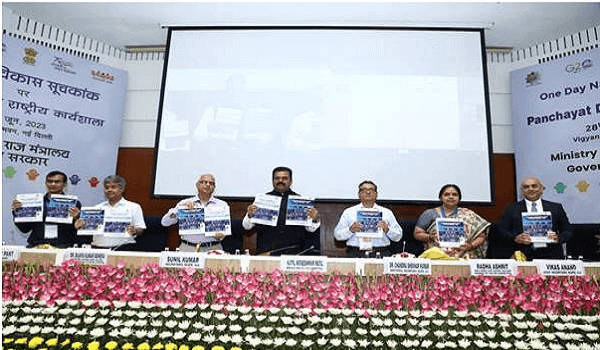Union Minister of State for Panchayati Raj, Shri Kapil Moreshwar Patil, released the Report on Panchayat Development Index (PDI) at a National Workshop on PDI. The workshop saw the participation of over 250 stakeholders, including senior government officials, ministry representatives, and key stakeholders in the field.
Panchayat Development Index
- The PDI is a composite index that measures the performance of panchayats in achieving the Localization of Sustainable Development Goals (SDGs).
- It provides a holistic and evidence-based assessment of the development status of panchayats, highlighting their strengths and weaknesses.
- The PDI aims to promote the Localization of SDGs by creating awareness among panchayats and stakeholders about their importance.
- It encourages panchayats to adopt best practices and innovations to improve their performance in achieving SDGs.
Ranking and Categorization
- The PDI provides rankings for panchayats at different levels, including district, block, and village, based on their overall scores.
- Panchayats are categorized into four grades: D (scores under 40%), C (40-60%), B (60-75%), A (75-90%), and A+ (above 90%).
Themes and Focus Areas
- The PDI considers nine themes, including poverty-free and enhanced livelihood, healthy village, child-friendly village, water-sufficient village, clean and green village, self-sufficient infrastructure, socially just and secured villages, good governance, and women-friendly village.
Applications and Benefits of the PDI
- The PDI can be used by states/union territories for Panchayati Raj Awards and to emphasize a data-driven and evidence-based approach to development.
- It serves as a tool for planning, monitoring, and evaluating schemes implemented by panchayats and other agencies aligned with the SDGs.
- The PDI facilitates the sharing of knowledge and experiences among panchayats and stakeholders for learning and replication of successful models and interventions.
Key Highlights of the Report on the PDI
- The pilot project was carried out in four districts of Maharashtra, namely Pune, Sangli, Satara, and Solapur.
- The data collected from the pilot project was used to compile the report of the Panchayat Development Index Committee.
- The pilot study showed that 70% of the panchayats in the four districts of Maharashtra fall in Category C, while 27% are in Category B.
- The report highlights the need for evidence-based planning, resources must be deployed where required for overall development.
Panchayati Raj Institution (PRI)
- PRI is a system of rural local self-government in India.
- Local Self Government is the management of local affairs by such local bodies who have been elected by the local people.
- PRI was constitutionalized through the 73rd Constitutional Amendment Act, 1992 to build democracy at the grass roots level and was entrusted with the task of rural development in the country.

